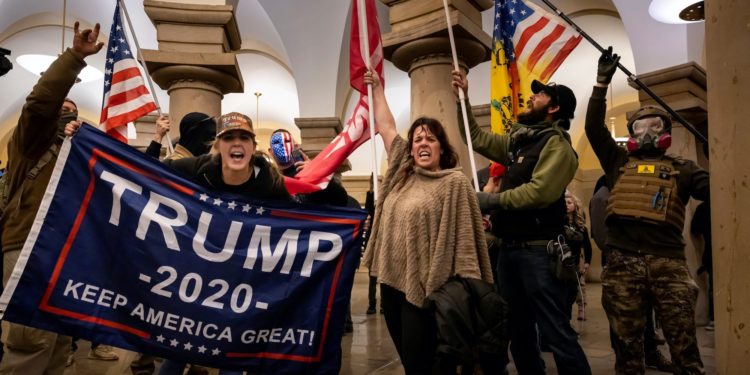A woman rioter who was shot and killed inside the building by Capitol police was an Air Force veteran.
In total, about 50 of the more than 400 people the Justice Department has charged in relation to the incidents of January 6 are active-duty, national guard, reserve troops, or veterans.
To be sure, there were radicals in the military before the assault on the Capitol, but the events of that were a perfect storm that brought many of them together.
For example, in January 2020, a Coast Guard lieutenant and self-described “White Nationalist” pleaded guilty to federal charges after being arrested while stockpiling weapons, drugs, and extremist literature.
In June 2020, an Air Force security forces sergeant was arrested and accused of ambushing and killing a deputy and wounding two other officers with an improvised explosive device in California.
“It’s hard to rationalize serving and protecting your country but also hating and opposing the very democratic process that makes it what it is. Our presidents are elected by a democratic process that, however imperfect it is, is sacred. It’s not up to us to question a president’s legitimacy after the American people have voted him to office,” a former Navy SEAL officer told Insider.
Military service members are allowed to participate in political organizations and attend political events when off duty, but active-duty troops are prohibited from sponsoring partisan groups or initiatives.
“Every unit has a few guys who are a bit off. Doesn’t mean they are bad dudes or they have done anything illegal, but they are a bit off in some regards — more secluded, more fringe with their beliefs or ideologies,” a Navy SEAL operator told Insider.
It isn’t just the US military that has issues with radicals in its ranks.
The German military has long struggled with extremism. Last year, it dissolved and reorganized the Kommando Spetzialkrafte — its tier-one special-operations unit, equivalent to Delta Force and SEAL Team 6 — because right-wing radicals had infiltrated it. More than 70 commandos in the 300-strong unit were suspended or kicked out of the German army.
A number of British troops have been investigated over concerns about far-right activity, and the Canadian military has cracked down on “hateful conduct” out of concern about infiltration by neo-Nazi and other groups. These events show that radicalization is an international issue.
Extremism and special-operations
The radicalization of current and former US service members didn’t start in the lead-up to January 6. It has always been there, albeit at a very small scale relative to the size of the US military.
The road to radicalization is paved with conspiracy theories. It’s the allure of knowing something others don’t, of being the keeper of a secret, that drives many people to such theories.
“If you think about it, it’s contradictory to promote, support, or actively participate in insurrection while you serve in the military. First thing you do when you enlist is you take an oath to the Constitution of the United States. Not to the president or any other political figure, but to the Constitution,” a Navy SEAL operator told Insider.
Many people entertain some conspiracies, such as the existence of aliens or the mystery of the Bermuda Triangle. Most don’t take them seriously enough to act on them, but that can change when special-operations troops — who are highly trained and taught to be aggressive and take the initiative — embrace fringe conspiracy theories, such as QAnon.
“And when the president, who is our commander-in-chief, mind you, acts against or tries to subvert the Constitution, then you have the right, and duty, I would add, to decline to follow such an illegal order,” the Navy SEAL operator said.
The long-term negative effects of radicalization on combat effectiveness are hard to assess, the former SEAL officer said, but one consequence could be weaker unit cohesion.
“If tribes were to be created, then, yes, we might have a problem,” the former officer added. “But this is the military, not your high-school football team. Discipline and good order are paramount even in special-operations forces.”
This article was written by Stavros Atlamazoglou and originally published on the Insider.










COMMENTS